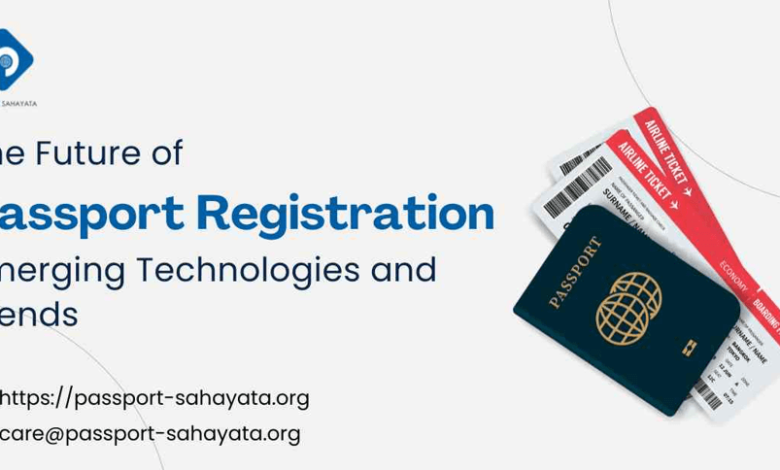The Future of Passport Registration: Emerging Technologies and Trends

The process of passport registration is undergoing a transformative evolution driven by emerging technologies and innovative trends. These advancements promise to enhance security, efficiency, and convenience for both applicants and authorities. As globalization continues to connect the world, the need for secure and streamlined Apply for passport registration processes becomes increasingly critical. This article explores the key technologies and trends shaping the future of passport registration.
The application process for Passport Registration
Step 1) Visit our online portal for Passport Registration.
Step 2) Select a type for registration of a new passport/ Tatkal passport on our registration portal.
Step 3) Fill all the correct details in the application form.
Step 4) Check all the details in the application form, enter the verification and submit the application form.
Step 5) Now make a successful payment for the application.
Step 6) After that, you will receive a confirmation number for registration on your registered email id.
Step 7) Visit the Passport Seva Kendra Office with the Scheduled appointment and reference ID along with all the required documents.
Biometric Authentication
Biometric authentication is at the forefront of revolutionizing passport registration. Technologies such as fingerprint scanning, facial recognition, QR codes and iris scanning are becoming standard practices for verifying an individual’s identity. These methods provide a higher level of security compared to traditional methods, reducing the risk of fraud and identity theft. Additionally, biometric data can be stored in passports’ embedded chips, facilitating quicker and more secure border crossings.
Blockchain Technology
Blockchain technology is emerging as a powerful tool for enhancing the security and integrity of passport data. By decentralizing information and making it tamper-proof, blockchain can prevent unauthorized changes to passport records. This technology ensures that personal data remains secure and verifiable, simplifying the authentication process for both passport issuers and immigration authorities.
Digital Passports
Digital passports, also known as e-passports or biometric passports, are gaining traction globally. These passports contain an embedded microchip that stores biometric information and other personal data. The transition to digital passports not only improves security but also speeds up the processing time at border control points. Furthermore, digital passports can be integrated with mobile applications, allowing travelers to manage their documents and travel plans more efficiently.
Artificial Intelligence and Machine Learning
Artificial Intelligence (AI) and Machine Learning (ML) are playing pivotal roles in modernizing passport registration. AI-powered systems can analyze vast amounts of data to detect anomalies and potential threats during the application process. Machine learning algorithms can improve the accuracy of biometric recognition and streamline the verification process. These technologies enhance the efficiency and reliability of passport issuance and monitoring.
Remote Identity Verification
The COVID-19 pandemic accelerated the adoption of remote identity verification technologies. Applicants can now complete the passport registration process from the comfort of their homes using secure online platforms. Video calls, AI-driven facial recognition, and document scanning apps enable remote verification, reducing the need for in-person visits to passport offices and making the process more accessible and convenient.
Cloud-Based Solutions
Cloud computing is another significant trend influencing passport registration. Cloud-based solutions enable secure storage and management of passport data, ensuring easy access and scalability. Governments and passport-issuing authorities can leverage cloud infrastructure to enhance collaboration, improve data analytics, and maintain high levels of data security. The flexibility and cost-effectiveness of cloud solutions make them an attractive option for modernizing passport registration systems.
Read also: The Impact of Udyam Registration on Business Financing and Loans
Quantum Cryptography
Quantum cryptography represents the next frontier in data security, promising unprecedented levels of protection for sensitive information. As quantum computing advances, quantum cryptography could be integrated into passport registration systems to secure communication channels and protect biometric and personal data from sophisticated cyber threats. This technology ensures that passport information remains safe, even in the face of evolving cyberattack strategies.
Mobile Passport Solutions
Mobile passport solutions are transforming how travelers interact with their travel documents. Mobile apps can now store digital versions of passports, allowing for easy access and management. These solutions often include features like real-time notifications about visa statuses, reminders for passport renewals, and secure digital wallets for storing travel documents. Mobile passports provide a seamless and efficient way for travelers to manage their documentation on the go.
Also, Read: How to apply for Passport and Visa
Conclusion
The future of passport registration is being shaped by cutting-edge technologies and innovative trends that prioritize security, efficiency, and user convenience. Biometric authentication, blockchain technology, digital passports, artificial intelligence, and remote identity verification are transforming the way passports are issued and managed. Additionally, cloud-based solutions, quantum cryptography, and mobile passport solutions are paving the way for even more advanced and secure systems. As these technologies continue to evolve, they will address the growing demands of a globalized world, ensuring that passport registration remains a robust and secure process. Embracing these advancements will not only enhance the experience for travelers but also fortify the integrity of international travel systems. The continued integration of these technologies promises a future where passport registration is seamless, secure, and accessible to all.






